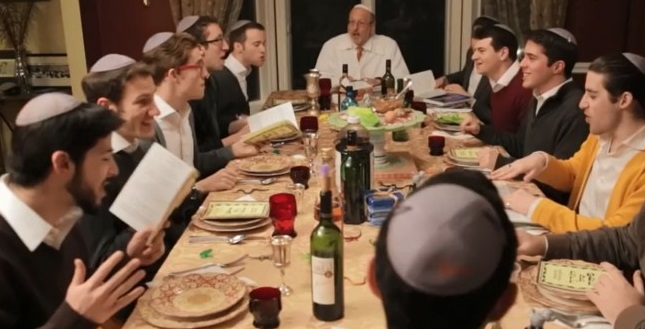THIS D’VAR TORAH IS ONE OF MANY PESACH IDEAS THAT I’VE WRITTEN UP FOR MY PERSONAL HAGGADAH. IF YOU’RE INTERESTED IN HAVING A WORD-DOCUMENT COPY OF THE HAGGADAH, PLEASE LET ME KNOW. CHAG SAMEI’ACH!
This D’var Torah is in Z’chus L’Ilui Nishmas my sister Kayla Rus Bas Bunim Tuvia A”H, my grandfather Dovid Tzvi Ben Yosef Yochanan A”H, & my great aunt Rivkah Sorah Bas Zev Yehuda HaKohein in Z’chus L’Refuah Shileimah for:
-My father Bunim Tuvia Ben Channa Freidel
-My grandfather Moshe Ben Breindel, and my grandmothers Channah Freidel Bas Sarah, and Shulamis Bas Etta
-Mordechai Shlomo Ben Sarah Tili
-Noam Shmuel Ben Simcha
-And all of the Cholei Yisrael
-It should also be a Z’chus for an Aliyah of the holy Neshamos of Dovid Avraham Ben Chiya Kehas—R’ Dovid Winiarz ZT”L, Miriam Liba Bas Aharon—Rebbetzin Weiss A”H, as well as the Neshamos of those whose lives were taken in terror attacks (Hashem Yikom Damam), and a Z’chus for success for Tzaha”l as well as the rest of Am Yisrael, in Eretz Yisrael and in the Galus.
בס״
פֶּסַח ~ Pesach
“A Moving Seder Table”
The Gemara in Pesachim [115B] tells us that just before Maggid, “Okrin Es HaShulchan”-“we uproot the table.” Why? You guessed it: “To get the children to ask…”
In fact, Abayei inquired about this practice as a child, to which Rabbah, the leader of the Seder, responded that Abayei had exempted everyone at the Seder from the recitation of “Mah Nishtanah” (the “Four Questions”).
Now, what exactly is the true meaning of this particular practice? Why do we care that this question be asked? And what is connection between this practice and the questions of Mah Nishtanah?
If we look at Abayei’s actual question, it is not just a question about the mere oddity of this practice of uprooting the table, but it’s about the seeming counterintuitive-ness of it; he protests the fact that they uprooted the table before they had a chance to eat off it. It’s a really good question! We might add that it would have been better not to put out the table altogether if our intention was not to eat off it yet.
In truth, we don’t even fully appreciate the truest depth of Abayei’s question yet. Because if we think about it, Abayei’s question, in some ways, is one to be asked every day of our lives. How, so? So, although at the Seder, we can ask it about this practice of removing the table, in truth, we’re supposed to be bothered by every seemingly unnecessary “uprooting of the table” in our own lives. It happens frequently enough that Hashem appears to be setting a table for us, and then, suddenly, He takes it away. And at those moments, we must genuinely wonder: “Why can’t I just sit and enjoy my meal?!”
In a similar vein, it’s fair to question, at our Seder: Why couldn’t Hashem just let the B’nei Yisrael either (1) remain comfortably on Egypt without suffering, or (2) never send them down there in the first place? Yes, He took them out, but why did He have to first uproot their table of royalty and send them to slavery? Why arrange a nice table just so that it can be taken away?
That’s the question of life that we have to reflect on at the Seder; the contradictions of life. Why give Avraham a Yitzchak and then command him to offer him has a Korban? Why give the wicked Eisav a comfortable spot in Sei’ir while Yaakov has to inherit wandering and bitter exile? Why create us in a world for the sake of giving us the ultimate pleasure, but then make us suffer?
In its essence, that’s the question of Mah Nishtanah! Why do we have Matzah and Maror on the one hand, but then dip and recline on the other? It’s a contradiction!
So, we ask again: Why uproot our table here and now if it was put here so that we can eat from it?
Once we appreciate the question—that’s the goal of the night, right?—then, we can begin to think about the answers.
And if we meditate on the Geulah of Yetzias Mitzrayim, we can get at least a glimpse into those answers. At the end of the day, Hashem’s Divine plan incorporates all of our best interests and ultimately features a destiny of eternal bliss and revealed good. However, that destiny somehow entails the struggle of exile. Whether as a cleansing process, a proving ground, or just a learning experience, Exile is apparently a prerequisite for Exodus. Without our table being uprooted, we could not properly yearn for and enjoy the royal banquet, the light of redemption at the end of the tunnel of bitter exile. Somehow, the question of the uprooted table is all a part of the “Seder” of life. It is a necessary part of that process.
May we be Zocheh to not only humbly acknowledge the important questions, both on Seder night and in life at large, but to even hear the answers and experience the ultimate good of the Divine plan in the form of the final Geulah and the coming of Moshiach, Bimheirah Biyomeinu! Have a Great Shabbos and Pesach/Chag Samei’ach!
-Yehoshua Shmuel Eisenberg 🙂

